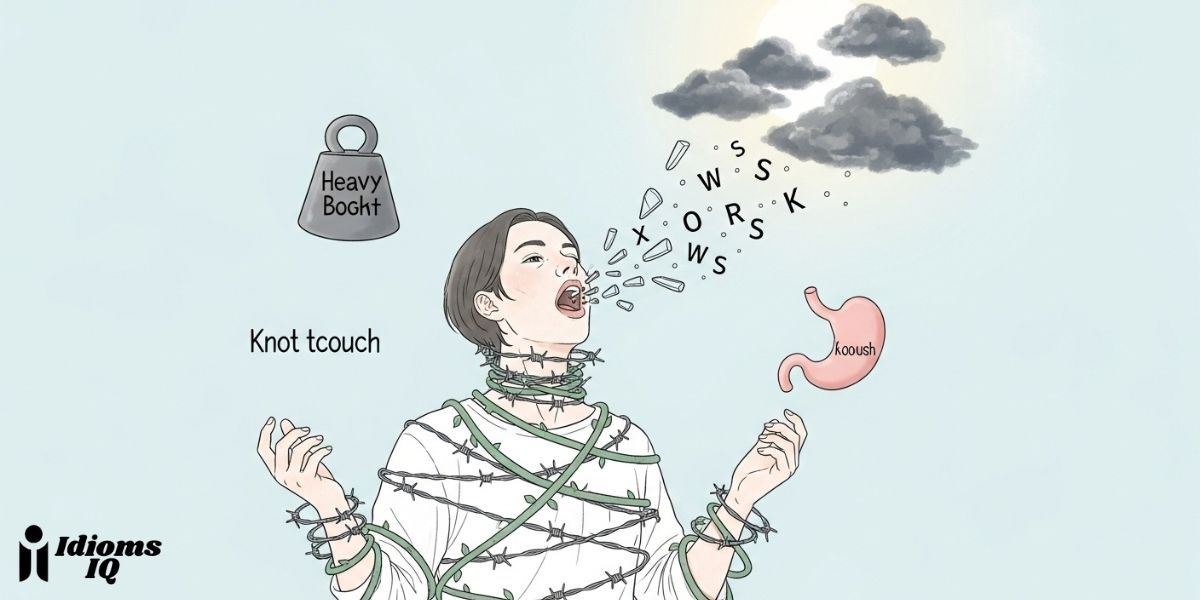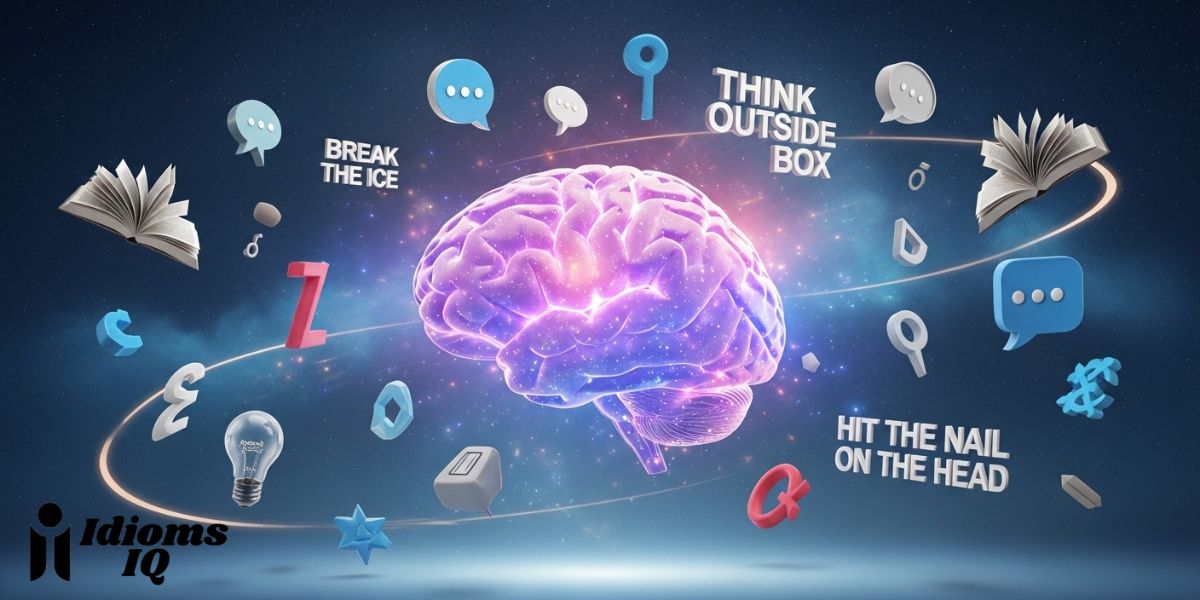
A clock ticks. It is a steady, mechanical, and impartial beat, measuring out life in predictable seconds, minutes, and hours. Yet, our experience of time is anything but steady or predictable. idioms, meaning “peculiar phraseology,” a fitting description for these unique expressions that are often specific to a single culture or language.
This exploration is about more than just learning new vocabulary. It is an invitation to see idioms as they truly are: tiny works of art, forms of artistic expression that we use daily to paint pictures of our experiences. The idioms we use for time, in particular, are masterpieces of human creativity. They allow us to take the abstract concept of time’s passage and give it shape, texture, emotion, and meaning. By learning them, we become more than just fluent speakers; we become more creative, nuanced, and emotionally intelligent communicators.
Related: Idioms for Hard Working
Part 1: The Hidden Artistry in Everyday Language
The Cognitive Leap: From Literal to Figurative
To appreciate the artistry of an idiom, it helps to understand the subtle magic it performs inside our minds. Most of the language we use follows a rule that linguists call the “principle of compositionality.” This principle states that the meaning of a sentence is built from the meanings of its individual parts. If someone says, “The blue car is fast,” we understand it because we know the meaning of “blue,” “car,” “is,” and “fast.”
Idioms are fascinating because they break this rule. The phrase “kick the bucket” has nothing to do with kicking or buckets; it means to die. This violation of logic is not a flaw; it is the source of the idiom’s power. When we hear an idiomatic phrase, our brain is forced to make a cognitive leap. It must switch from literal, analytical thinking to abstract, conceptual thought to decipher the meaning. This mental shift is a creative act, similar to interpreting a metaphor in a poem or a symbol in a painting. It engages us, forcing us to connect with the language on a deeper, more imaginative level.
Making the Intangible Tangible
The human brain is wired to understand the world through concrete, sensory experiences. A child learns what an “apple” is not by reading a definition, but by seeing its round, red shape, feeling its smooth skin, and tasting its crisp sweetness. Only after these concrete experiences does the abstract word “apple” take on its full meaning. Abstract concepts like justice, love, or freedom present a challenge because they lack this physical form.
Language evolved to bridge this gap through the power of metaphor, which allows us to represent and manipulate abstract ideas by mapping them onto things we already know from our physical world. When we say “life is a journey,” we transfer the familiar, concrete idea of a road with its twists, turns, and destinations onto the abstract concept of life, making its ups and downs easier to grasp.
Idioms about time are a perfect demonstration of this cognitive process. They are not merely decorative phrases; they are essential tools that our minds have developed to make the abstract concept of time tangible. Time itself is invisible and untouchable, so these expressions give it a physical form we can understand and, more importantly, feel.
Consider the phrase “like sand through an hourglass.” This idiom makes time a physical substance, grains of sand that we can visualize slipping irrevocably through our fingers. The phrase “beat the clock” transforms time into a competitor in a race, a physical opponent we must overcome. “A stitch in time saves nine” imagines time as a piece of fabric that can be mended with a physical action. These are not just clever sayings. They are the linguistic prototypes that allow our concrete-oriented brains to grasp, manage, and express our complex emotional relationship with the abstract flow of time. Without them, our conversations about this fundamental aspect of existence would be far more difficult and emotionally barren.
Part 2: A Gallery of Time: 40 Idioms and Their Meanings
Welcome to our gallery of time. Like any art collection, this one is organized thematically. Each of the following five sections explores a different facet of our relationship with time, showcasing the diverse emotional colors and textures that language uses to paint its portrait.
Gallery 1: The Rush – Idioms for Time in Motion
This collection captures the feeling of time passing quickly. The imagery here is often filled with a sense of wonder, nostalgia, or even a touch of anxiety as moments slip away.
- Time flies
- Meaning: Time passes very quickly, especially when you are enjoying yourself.
- Example: “I can’t believe our vacation is already over. Time flies when you’re having fun!”
- Creative & Emotional Insight: This is perhaps the most famous idiom about time. It personifies time, giving it the wings of a bird or insect. This captures the feeling that time is an independent entity with a will of its own, moving swiftly and often without our consent.
- In the blink of an eye
- Meaning: Something happens almost instantaneously, in an immeasurably short period.
- Example: “The car was there one moment and then, in the blink of an eye, it was gone.”
- Creative & Emotional Insight: This idiom connects the passage of time to a simple, involuntary human action. It grounds the abstract concept in a physical experience we all know, emphasizing a shocking or surprising quickness.
- Gone in a flash
- Meaning: Something disappears or ends extremely quickly.
- Example: “The opportunity to buy tickets at that price was gone in a flash.”
- Creative & Emotional Insight: The image of a flash of light brilliant but momentary perfectly captures the feeling of a fleeting chance or a moment that ends before we can fully grasp it.
- Time zips by
- Meaning: Time moves rapidly, almost without you noticing.
- Example: “When you’re focused on a project you love, time just zips by.”
- Creative & Emotional Insight: The word “zips” evokes the modern, mechanical sound of a zipper. It’s a more contemporary and energetic alternative to “flies,” suggesting a smooth, fast, and almost noiseless progression.
- Like sand through an hourglass
- Meaning: Time passes steadily and inevitably.
- Example: “Watching my children grow up feels like sand through an hourglass; I can’t stop it.”
- Creative & Emotional Insight: This powerful image makes time a tangible substance. Each grain of sand represents a moment, and the visual of them falling one by one evokes a deep sense of finality and the unstoppable nature of life’s progression.
- In no time flat
- Meaning: To do something very quickly, almost instantly.
- Example: “Don’t worry, I’ll have this report finished in no time flat.”
- Creative & Emotional Insight: The addition of “flat” adds a sense of certainty and emphasis. It suggests a speed that is not just fast, but definitively and impressively so, like a runner finishing a race with a record time.
- A mile a minute
- Meaning: Happening at a very fast rate.
- Example: “She talks a mile a minute; it’s sometimes hard to keep up.”
- Creative & Emotional Insight: This idiom uses a measurement of distance (1 mile) to describe a measurement of time (1 minute), creating a vivid metaphor for incredible speed and intensity. It’s often used to describe rapid speech or thought.
- The hours fly by
- Meaning: A variation of “time flies,” emphasizing that large chunks of time are passing quickly.
- Example: “We were so engrossed in our conversation that the hours flew by.”
- Creative & Emotional Insight: By focusing on “hours” instead of the more general “time,” this phrase highlights the experience of losing track of a significant portion of the day, often due to deep engagement or enjoyment.
- Time slips away
- Meaning: Time passes without one noticing, often with a sense of regret or powerlessness.
- Example: “You get busy with work and family, and before you know it, time slips away.”
- Creative & Emotional Insight: The imagery here is subtle and poignant. It suggests that time is a slippery, elusive thing that cannot be held. The verb “slips” conveys a quiet, almost stealthy departure, capturing the melancholy realization that precious moments are gone forever.
- Like there’s no tomorrow
- Meaning: To do something with great speed, energy, or recklessness, without considering the future consequences.
- Example: “They partied like there’s no tomorrow, and they definitely regretted it the next morning.”
- Creative & Emotional Insight: This idiom captures a feeling of frantic, hedonistic urgency. It paints a picture of someone trying to cram all of life’s experiences into a single moment, driven by either pure joy or a deep-seated fear that their time is running out.
Gallery 2: The Race – Idioms of Urgency and Deadlines
This gallery explores the pressure-cooker of modern life. The language here is active, dramatic, and filled with the suspense of working against a ticking clock.
- Against the clock
- Meaning: To be in a great hurry to get something done before a particular time or deadline.
- Example: “The team is working against the clock to finish the project before the launch date.”
- Creative & Emotional Insight: This phrase personifies the clock as an adversary. It’s not just a tool for measuring time; it’s an opponent in a race, creating a sense of conflict and high stakes.
- At the eleventh hour
- Meaning: At the last possible moment before it is too late.
- Example: “She submitted her application at the eleventh hour, just minutes before the deadline.”
- Creative & Emotional Insight: This idiom creates a powerful sense of cinematic suspense. By placing the action at the 11th hour on a 12-hour clock, it vividly illustrates being on the absolute brink of a deadline, where success or failure hangs in the balance.
- In the nick of time
- Meaning: Just in time; at the very last moment, narrowly avoiding being too late.
- Example: “We ran for the train and made it in the nick of time.”
- Creative & Emotional Insight: “Nick” refers to an old practice of making a small cut or notch to keep score or time. The image suggests arriving at the precise, final mark with absolutely no room to spare. It conveys a feeling of relief after a close call.
- Down to the wire
- Meaning: A situation whose outcome is not decided until the very end.
- Example: “The election was incredibly close; it really went down to the wire.”
- Creative & Emotional Insight: This phrase comes from horse racing, where a wire was stretched across the finish line to help judges determine the winner in a close race. The idiom borrows this “photo-finish” intensity, perfectly describing any high-stakes situation that remains uncertain until the final second.
- Beat the clock
- Meaning: To finish something just before the deadline.
- Example: “He managed to beat the clock and file his taxes with only minutes to spare.”
- Creative & Emotional Insight: Similar to “against the clock,” this idiom frames time as a competitor. However, “beat” implies a clear victory, a triumphant moment of succeeding just before time runs out.
- Time is of the essence
- Meaning: A formal phrase indicating that speed and punctuality are extremely important.
- Example: “In an emergency medical situation, time is of the essence.”
- Creative & Emotional Insight: This expression elevates time to the “essence” or core of a situation. It implies that time is not just a factor but the most critical element, and any delay could lead to failure. It carries a weight of seriousness and importance.
- The clock is ticking
- Meaning: A reminder that time is running out and a deadline is approaching.
- Example: “We need to make a decision soon. The clock is ticking.”
- Creative & Emotional Insight: This idiom uses auditory imagery the sound of a ticking clock to create a palpable sense of mounting pressure and urgency. It’s a simple but incredibly effective way to build tension.
- Crunch time
- Meaning: The critical period just before a deadline when pressure is high and work must be done quickly.
- Example: “It’s crunch time for the students as they prepare for their final exams.”
- Creative & Emotional Insight: The word “crunch” evokes the sound of something being crushed under pressure. This visceral image perfectly captures the stressful, intense feeling of the final push to meet a goal.
- Race against time
- Meaning: A situation where one has to do something very quickly to avoid a negative outcome.
- Example: “The paramedics were in a race against time to get the patient to the hospital.”
- Creative & Emotional Insight: This phrase frames a situation as an epic contest. It’s not just about meeting a deadline; it’s a dramatic struggle against the relentless forward march of time itself, often in life-or-death scenarios.
- At the last minute
- Meaning: The latest possible time before an event.
- Example: “He always packs for his trips at the last minute.”
- Creative & Emotional Insight: This is a straightforward yet powerful idiom. It highlights the human tendency toward procrastination and the thrill or stress of completing a task just before it’s too late.
Gallery 3: The Pause – Idioms for Wasting and Waiting
This section examines the dual nature of “empty” time. The language here can reflect the pleasant idleness of a lazy afternoon or the frustrating stagnation of a project going nowhere.
- Kill time
- Meaning: To do something to occupy yourself while waiting for something else to happen.
- Example: “We had an hour before our movie started, so we walked around the mall to kill time.”
- Creative & Emotional Insight: This is a surprisingly violent metaphor. The idea of “killing” time suggests an adversarial relationship with boredom, as if unoccupied time is an enemy that must be defeated.
- Have time on one’s hands
- Meaning: To have more free time than you know what to do with.
- Example: “Since retiring, my grandfather has too much time on his hands.”
- Creative & Emotional Insight: This idiom treats time like a physical object that can accumulate in your hands. The phrase “too much” often carries a slightly negative connotation, implying boredom or a lack of purpose.
- Twiddle your thumbs
- Meaning: To do nothing for a period of time, usually while waiting for something to happen.
- Example: “We were just twiddling our thumbs at the office while we waited for the internet to be fixed.”
- Creative & Emotional Insight: This idiom paints a perfect visual of idle boredom. The small, repetitive, and pointless action of twiddling one’s thumbs is a universal symbol of having absolutely nothing productive to do.
- Spin your wheels
- Meaning: To expend effort with little or no progress.
- Example: “I feel like I’m just spinning my wheels in this job; I’m not learning anything new.”
- Creative & Emotional Insight: This creates a vivid and frustrating image of a car stuck in mud. The wheels are spinning, the engine is roaring, and energy is being used, but the vehicle isn’t moving. It perfectly captures the feeling of being stuck in a rut despite one’s best efforts.
- Drag your feet
- Meaning: To do something slowly or reluctantly because you don’t want to do it.
- Example: “The committee is dragging its feet on making a decision.”
- Creative & Emotional Insight: The physical act of dragging one’s feet is a clear sign of reluctance and slowness. The idiom uses this body language as a metaphor for procrastination and deliberate delay.
- Burn daylight
- Meaning: To waste time, especially by delaying the start of something in the morning.
- Example: “Come on, let’s get started on this hike! We’re burning daylight!”
- Creative & Emotional Insight: This rustic-sounding idiom evokes an era before artificial light, when daylight was a precious resource for work. “Burning” suggests a wasteful and irreversible destruction of this valuable commodity.
- Fritter away time
- Meaning: To waste time on small, unimportant things.
- Example: “I meant to be productive, but I just frittered away the afternoon scrolling through social media.”
- Creative & Emotional Insight: “Fritter” means to break something into small pieces. The idiom suggests that we can waste time not just in large chunks, but by letting it crumble away in tiny, insignificant moments that eventually add up to a significant loss.
- Sit on your hands
- Meaning: To do nothing or fail to take action when you should.
- Example: “The management just sat on their hands while the company’s problems got worse.”
- Creative & Emotional Insight: This is a powerful image of deliberate inaction. By literally sitting on one’s hands, a person makes it impossible to work or help. The idiom implies a conscious choice to remain passive, often in a situation that demands intervention.
- Dawdle
- Meaning: To waste time or move slowly and idly.
- Example: “Stop dawdling or we’re going to be late for school!”
- Creative & Emotional Insight: While not a multi-word idiom, “dawdle” functions similarly by painting a picture. The sound of the word itself—soft and drawn-out—seems to mimic the slow, aimless movement it describes.
- Time’s a-wasting
- Meaning: A colloquial expression meaning time is passing and we need to hurry up.
- Example: “Let’s finish this up, people. Time’s a-wasting!”
- Creative & Emotional Insight: This is an old-fashioned, folksy phrase that feels both like a gentle nudge and a firm command. The “-a” is a remnant of older English grammar, giving the phrase a timeless, almost proverbial quality.
Gallery 4: The Treasure – Idioms on the Value of Time
This collection presents idioms that treat time as a precious, finite resource. The language here is often pragmatic and philosophical, urging us to manage, save, and respect our most valuable asset.
- Time is money
- Meaning: Time is a valuable resource, so it is better to do things as quickly as possible.
- Example: “I can’t stand waiting in long lines; time is money, after all.”
- Creative & Emotional Insight: This famous aphorism, often attributed to Benjamin Franklin from his 1748 essay “Advice to a Young Tradesman,” is more than just a simple equation; it is a cultural fingerprint. By directly comparing the universal constant of time to the human construct of money, the idiom frames our existence in economic terms. It arose from a specific historical context—the dawn of industrial capitalism—where labor began to be measured in hours and productivity became a paramount virtue. This perspective treats time not as a cyclical, natural rhythm (like the seasons), but as a linear, finite resource that can be spent, saved, or wasted, just like financial capital. When we use this phrase, we are unconsciously echoing a worldview that prioritizes efficiency and economic output as the primary measures of a life well-lived.
- A stitch in time saves nine
- Meaning: It is better to deal with a problem right away, because if you wait, it will get worse and take longer to fix.
- Example: “You should fix that small leak in the roof now. Remember, a stitch in time saves nine.”
- Creative & Emotional Insight: This proverb uses the simple, domestic act of sewing to illustrate a profound truth about proactivity. The image is clear and practical: one small, easy stitch now prevents the need for nine larger, more difficult stitches later. It transforms the abstract benefit of timely action into a concrete, measurable result.
- Time waits for no one
- Meaning: Time continues to pass regardless of what is happening; you cannot stop it.
- Example: “You should tell her how you feel. Time waits for no one.”
- Creative & Emotional Insight: This idiom personifies time as a powerful, indifferent force. It is not a friend that will wait for you to catch up, nor an enemy you can fight. It simply moves forward, unstoppable. The phrase carries a sense of solemn urgency, reminding us that opportunities are fleeting and life is short.
- Time is precious
- Meaning: Time is extremely valuable and should not be wasted.
- Example: “As I get older, I realize more and more that time is precious and I want to spend it with the people I love.”
- Creative & Emotional Insight: By describing time with an adjective usually reserved for jewels or rare metals, this phrase elevates it to the status of a treasure. It’s a simple but profound statement that reframes our perspective, encouraging us to see each moment not as something to be simply “spent,” but as something to be cherished.
- Lost time is never found again
- Meaning: Once time has passed, it is gone forever and cannot be recovered.
- Example: “I regret not traveling more when I was younger because lost time is never found again.”
- Creative & Emotional Insight: This proverb, also associated with Benjamin Franklin, uses the metaphor of a lost object to describe time. However, it adds a tragic twist: unlike a lost key or wallet, lost time is unrecoverable. The phrase imparts a powerful lesson about the finality of the past and the importance of living in the present.
Gallery 5: The Calendar – Idioms for Marking Life’s Rhythm
This final gallery covers idioms that give scale and context to our lives. They help us mark the rhythm of our days, from rare, special events to the simple closure of a day’s work.
- Once in a blue moon
- Meaning: Something that happens very rarely.
- Example: “My brother lives in another country, so I only see him once in a blue moon.”
- Creative & Emotional Insight: A “blue moon” is a real astronomical phenomenon—the second full moon in a single calendar month—that occurs infrequently. The idiom borrows the magic and rarity of this celestial event to describe the specialness of an uncommon occurrence in our own lives.
- For donkey’s years
- Meaning: A very long time.
- Example: “I’ve known my best friend for donkey’s years—we met in kindergarten.”
- Creative & Emotional Insight: This is a humorous and informal British idiom. It’s thought to be a pun on the long “ears” of a donkey. The playful, slightly absurd image adds a warm and affectionate tone when describing a long-standing relationship or a lengthy period.
- Call it a day
- Meaning: To decide to stop working or doing an activity for the day.
- Example: “We’ve been working for ten hours straight. I think it’s time to call it a day.”
- Creative & Emotional Insight: This simple phrase is a powerful social ritual. The act of “calling” it a day implies a declaration, a shared agreement to mark the end of labor and the beginning of rest. It provides a sense of closure and accomplishment.
- The eleventh hour (Re-contextualized)
- Meaning: As seen before, this means the last possible moment. In this context, it marks a definitive endpoint.
- Example: “The peace treaty was signed at the eleventh hour, preventing a war.”
- Creative & Emotional Insight: Beyond just deadlines, this idiom can mark the dramatic finality of an era or a decision. It signifies the moment just before a fundamental change, the last tick of the clock before a new reality begins.
- All in good time
- Meaning: Used to tell someone to be patient because something will happen when the time is right.
- Example: “I know you’re eager to get promoted, but be patient. It will happen all in good time.”
- Creative & Emotional Insight: This idiom is a soothing and philosophical piece of advice. It suggests that time has its own wisdom and rhythm. It counters our modern obsession with speed and urgency, offering a comforting reminder that some things cannot be rushed and will unfold naturally when they are meant to.
Part 3: Your Turn to Be the Artist: A Creative Practice
Now that we’ve toured the gallery, it’s your turn to play with the paint. The best way to truly understand and remember these idioms is to connect them to your own life and creativity. This isn’t a test; it’s an invitation to use these linguistic tools to better understand your own reality, much like an artist uses their craft.
The Two-Step Practice
- Step 1: Connect to a Memory.
Choose one idiom from the list of 40 that truly resonates with you. Think about a time in your life when you felt the emotion captured by that phrase. In two or three sentences, describe that specific memory. Grounding the abstract phrase in a concrete, personal experience is the most powerful way to make it stick.
- Example: Using “In the blink of an eye.”
“I remember dropping my daughter off for her first day of kindergarten. I knelt down to hug her, and she seemed so small. Then I blinked, and I was watching her walk across the stage to receive her high school diploma. That whole chapter of my life went by in the blink of an eye.”
- Step 2: Paint the Literal Picture.
Now, take that same idiom and engage with its inner artwork. Close your eyes and visualize the literal image of the phrase. What does it look like? What sounds do you hear? What does it feel like? Describe that literal scene in a few sentences. This practice helps you appreciate the creative genius embedded in the language and strengthens your connection to its meaning.
- Example: Using “Spinning your wheels.”
“I picture an old pickup truck on a muddy country road after a storm. The engine is screaming, and the driver’s face is tense with frustration. The tires are caked in thick, brown mud, spinning furiously but only digging the truck deeper into the rut. The smell of burning rubber and wet earth hangs in the air.”
Feel free to share your creative responses in the comments below. Language is a communal art form, and your stories will enrich everyone’s understanding.
Conclusion:
Idioms are so much more than quirky phrases or vocabulary words to memorize. They are the brushstrokes our ancestors used to paint a picture of the world, giving shape, color, and emotion to the invisible river of time. They are testaments to human creativity, turning abstract feelings into vivid, memorable images that we all can share. By learning to use them, we connect with a long tradition of linguistic artistry and empower ourselves to describe our own experiences with greater precision and heart.
The passage of time can often feel overwhelming, like a force of nature beyond our control. But as we’ve seen, language gives us the tools to frame it, to understand it, and to find our place within its flow. It reminds us of a simple, powerful truth captured in a wonderful quote: “The bad news is time flies. The good news is you’re the pilot”.






